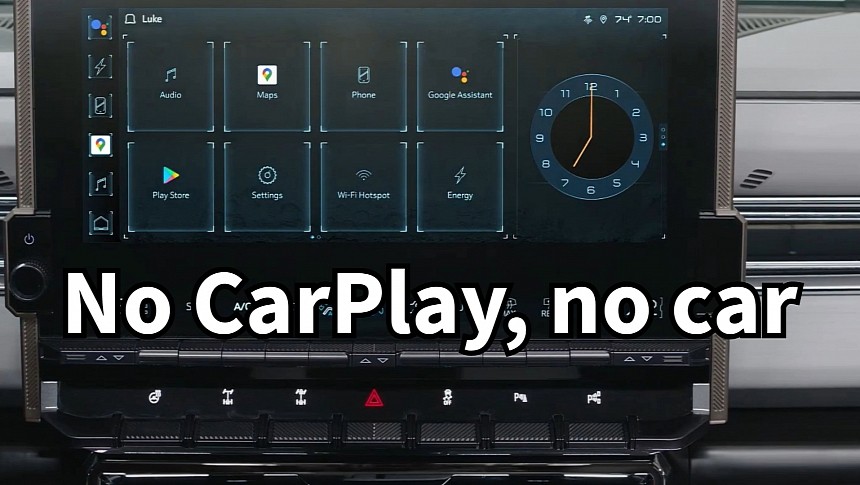Some carmakers are moving away from offering Apple CarPlay and Android Auto support, but this doesn't look like a smart move. A recent McKinsey study shows that almost half of new car buyers would not even consider a vehicle without these connectivity features.
Update: I updated the fourth paragraph to add GM's clarification on their subscription-based approach to Android Automotive.
Connectivity solutions are increasingly important for car buyers, who expect access to online streaming services, over-the-air software upgrades, and real-time navigation features in their vehicles. With few exceptions, most car owners would use smartphone integration features, such as Android Auto and Apple CarPlay, over the factory-installed apps and services. And yet, some carmakers refuse to offer these features to their customers.
Tesla set the tone with this trend, as its EVs rely solely on in-car connectivity features. Android Auto and Apple CarPlay were never on offer and never will. Still, Tesla owners are unanimous that Tesla navigation and apps are at least as good as the smartphone features accessed through Apple and Google car interfaces. This is why most don't consider CarPlay and Android Auto a priority, although some admit it would be nice to have.
Apart from Tesla, all other car brand lags in connectivity features, or their software is buggy. Rivian is wrestling with its customers, refusing to offer Android Auto and Apple CarPlay despite owners desperately asking for them. Although the current state of affairs looks patchy, the EV startup hopes its software will improve fast, and its customers won't feel the need for smartphone-projected apps in the future.
The situation is different with GM. The legacy carmaker announced recently that it will transition to an Android Automotive operating system in its future vehicles, and Apple CarPlay support will not be offered. Android Auto would technically not be needed since the infotainment system will provide access to the same apps as the phone. GM offers standard connectivity that allows customers to access Google Maps and Google Assistant at no additional cost for eight years, beginning at the time of vehicle purchase. After that, you need to pay a subscription to access these functions.
The stubbornness of these carmakers might cost them dearly in the future, as the recent McKinsey Mobility Consumer Pulse Survey shows. According to this study, almost half of car buyers will not purchase a vehicle without Apple CarPlay or Android Auto. People are used to having these smartphone projection interfaces, and they overwhelmingly (85%) prefer it over the OEM's built-in system. This spells trouble for carmakers insisting on using their built-in connectivity features, especially for those offering half-baked solutions.
The study analyzes the preferences of both ICE vehicle owners and EV owners, which differ quite significantly when it comes to software and connectivity solutions. For instance, having an unlimited in-car mobile data plan is far more critical for EV buyers, who placed this feature among the top eight individual connectivity features out of 21 features tested. ICE buyers considered this feature less relevant.
Connectivity solutions are increasingly important for car buyers, who expect access to online streaming services, over-the-air software upgrades, and real-time navigation features in their vehicles. With few exceptions, most car owners would use smartphone integration features, such as Android Auto and Apple CarPlay, over the factory-installed apps and services. And yet, some carmakers refuse to offer these features to their customers.
Tesla set the tone with this trend, as its EVs rely solely on in-car connectivity features. Android Auto and Apple CarPlay were never on offer and never will. Still, Tesla owners are unanimous that Tesla navigation and apps are at least as good as the smartphone features accessed through Apple and Google car interfaces. This is why most don't consider CarPlay and Android Auto a priority, although some admit it would be nice to have.
Apart from Tesla, all other car brand lags in connectivity features, or their software is buggy. Rivian is wrestling with its customers, refusing to offer Android Auto and Apple CarPlay despite owners desperately asking for them. Although the current state of affairs looks patchy, the EV startup hopes its software will improve fast, and its customers won't feel the need for smartphone-projected apps in the future.
The situation is different with GM. The legacy carmaker announced recently that it will transition to an Android Automotive operating system in its future vehicles, and Apple CarPlay support will not be offered. Android Auto would technically not be needed since the infotainment system will provide access to the same apps as the phone. GM offers standard connectivity that allows customers to access Google Maps and Google Assistant at no additional cost for eight years, beginning at the time of vehicle purchase. After that, you need to pay a subscription to access these functions.
The stubbornness of these carmakers might cost them dearly in the future, as the recent McKinsey Mobility Consumer Pulse Survey shows. According to this study, almost half of car buyers will not purchase a vehicle without Apple CarPlay or Android Auto. People are used to having these smartphone projection interfaces, and they overwhelmingly (85%) prefer it over the OEM's built-in system. This spells trouble for carmakers insisting on using their built-in connectivity features, especially for those offering half-baked solutions.
The study analyzes the preferences of both ICE vehicle owners and EV owners, which differ quite significantly when it comes to software and connectivity solutions. For instance, having an unlimited in-car mobile data plan is far more critical for EV buyers, who placed this feature among the top eight individual connectivity features out of 21 features tested. ICE buyers considered this feature less relevant.







